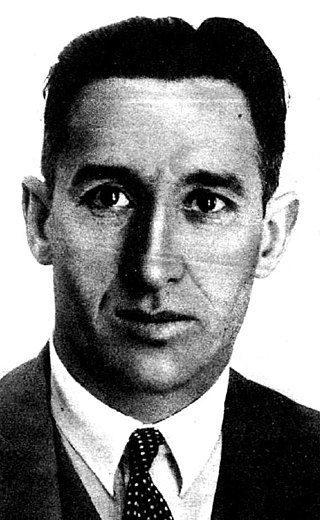
Syndicalism is a revolutionary current within the labor movement that, through industrial unionism, seeks to unionize workers according to industry and advance their demands through strikes, with the eventual goal of gaining control over the means of production and the economy at large through social ownership. Developed in French labor unions during the late 19th century, syndicalist movements were most predominant amongst the socialist movement during the interwar period that preceded the outbreak of World War II.
Anarcho-syndicalism is a political philosophy and anarchist school of thought that views revolutionary industrial unionism or syndicalism as a method for workers in capitalist society to gain control of an economy and thus control influence in broader society. The goal of syndicalism is to abolish the wage system, regarding it as wage slavery. Anarcho-syndicalist theory generally focuses on the labour movement. Reflecting the anarchist philosophy from which it draws its primary inspiration, anarcho-syndicalism is centred on the idea that power corrupts and that any hierarchy that cannot be ethically justified must be dismantled.
A national trade union center is a federation or confederation of trade unions in a country. Nearly every country in the world has a national trade union center, and many have more than one. In some regions, such as the Nordic countries, different centers exist on a sectoral basis, for example, for blue collar workers and professionals.
The International Workers' Association – Asociación Internacional de los Trabajadores (IWA–AIT) is an international federation of anarcho-syndicalist labor unions and initiatives.

The General Confederation of Labor is a Spanish trade union federation.

Ángel Pestaña Nuñez (1886–1937) was a Spanish anarcho-syndicalist general secretary of the Confederación Nacional del Trabajo (CNT), founder of the Syndicalist Party and member of the Cortes Generales.
The United Trade Union of Guinean Workers is a national trade union center in Guinea. It is affiliated with the International Trade Union Confederation.
The Nicaraguan Workers' Centre (CTN) is a national trade union center in Nicaragua. It was formed in 1962 as the Nicaraguan Autonomous Trade Union Movement (MOSAN), and changed its name to the CTN in 1972.
The Nigerien Confederation of Labour (CNT) is a trade union federation in Niger. Founded in 1996, the CNT unites 5 unions, and is affiliated with the International Trade Union Confederation.
The National Workers' Central (CNT) is a national trade union center in Paraguay. It was formed in 1963 as the Christian Workers' Central (CCT) and changed its name in 1978.
Trade unions in Niger are free to engage in regular unionist activities, with constitutionally protected provisions for forming and joining trade unions. However, with 95% the working population engaged in subsistence activities, the numbers of trade union members are low.

The Confederación Nacional del Trabajo is a Spanish confederation of anarcho-syndicalist labour unions, which was long affiliated with the International Workers' Association (AIT). When working with the latter group it was also known as CNT-AIT. Historically, the CNT has also been affiliated with the Federación Anarquista Ibérica ; thus, it has also been referred to as the CNT-FAI. Throughout its history, it has played a major role in the Spanish labor movement.
The Charter of Amiens was adopted at the 9th Congress of the Confédération générale du travail (CGT) French trade-union, which took place in Amiens in October 1906. Its main proposal was the separation between the union movement and the political parties. The CGT was then dominated by anarcho-syndicalists who preferred the constitution of an alternate system through the elaboration of workers' unions rather than moderate reforms through the electoral path. The motion for the Charter was drafted by Victor Griffuelhes, general secretary of the CGT, and Émile Pouget. The Charter was adopted by 830 participants, eight having voted "no" and one abstained, and marked the victory of the current of revolutionary syndicalism in the CGT of the time.
Trade unionism is a powerful force in the politics, economy, and culture of Senegal, and was one of the earliest trades union movements to form in Francophone West Africa.
Confederación Nacional del Trabajo was a central trade union confederation in Colombia. CNT was formed in 1953, with support from the military government of General Gustavo Rojas Pinilla. CNT was built up along the lines of the Argentinian peronista unions, and CNT was affiliated to the Agrupación de Trabajadores Latinoamericanos Sindicalistas. CNT received financial aid from ATLAS. Moreover, CNT received direct support from the Colombian Ministry of Labour through the minister Aurelio Caicedo Ayerbe. CNT was given access to issue propaganda through public radio stations.
Trade unions in Colombia were, until around 1990, among the strongest in Latin America. However the 1980s expansion of paramilitarism in Colombia saw trade union leaders and members increasingly targeted for assassination. As a result, Colombia has been the most dangerous country in the world for trade unionists for several decades. Between 1986 and 2010 over 2800 labor leaders were killed according to one source, and over 4000 according to others. Most assassinations were carried out by paramilitaries or the Colombian military; some were carried out by the guerrillas. In 2009 only around 4% of workers in Colombia were unionized.

Juan López Sánchez was a Spanish construction worker, anarchist and member of the Confederación Nacional del Trabajo, and one of the founders of the Federación Sindicalista Libertaria. During the Spanish Civil War (1936–1939) he was Minister of Commerce under Francisco Largo Caballero. After the war he spent several years in exile before returning to Spain where he lived without persecution and participated in the "vertical" trade union movement authorized by the dictatorship of General Francisco Franco.
Evelio Boal López was a Spanish graphic designer, trade unionist and anarchist. He was one of the organizers of the Congress of Sants of the National Confederation of Labor, forming part of the commission that wrote the report.





